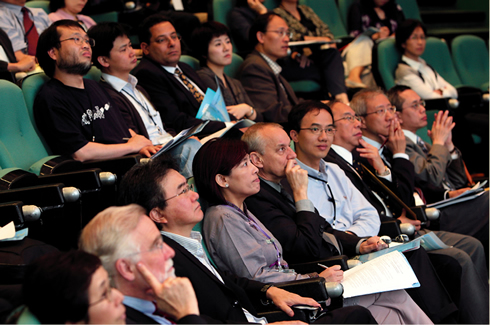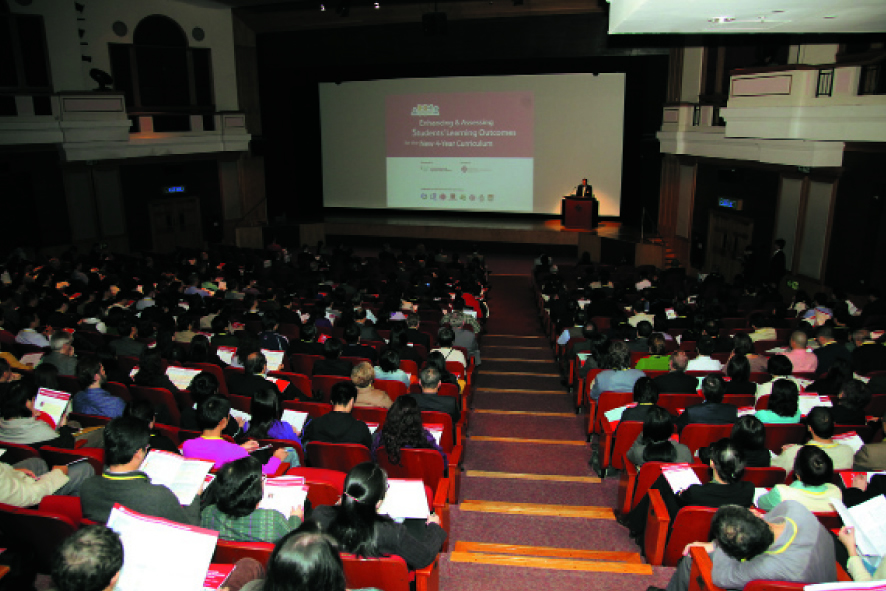The UGC and the funded institutions
are committed to the implementation of the "3+3+4" academic
reform. The UGC is aware of the challenges that lie ahead and the
tremendous amount of work needed to make the transition a success.
Thus, the UGC positions itself as a strong supporter and facilitator,
by providing financial support, offering independent advice, and
liaising between the Government and the UGC sector.
(A)
Academic Development
The four-year undergraduate academic
structure will be implemented starting from 2012/13. This is a
landmark milestone of Hong Kong's education reform, and the UGC
attaches utmost importance to its preparation.
The UGC has been working
hand-in-hand with the Administration and the institutions on a wide
array of issues, including the double cohort, capital works,
improvements in teaching and in students' learning experience,
curriculum enhancement, student admission, etc. The UGC has a
dedicated "3+3+4 Group" which provides a platform for supporting
and overseeing institutions' preparatory work in this significant
exercise.
The implementation of the four-year
undergraduate academic structure emphasises broader learning
experiences and more flexible choices in course offerings, and is not
a simple add-on to the current three-year undergraduate curriculum. As
such, institutions are taking the opportunity to do a complete
overhaul of the curriculum, and the revised curriculum will
incorporate new elements (e.g. inter-disciplinary or
multi-disciplinary studies, all-round education, whole person
development, outcome-based learning, etc.) and ensure their coherence.
Some of the new elements are being phased in during 2009-12, so as to
benefit existing students enrolling on three-year undergraduate
curriculum.
 |
"Admission
to Universities under the '3+3+4' Transition" - second
symposium sponsored by the UGC on "3+3+4" related issues
held on 25 April 2009 |
Starting from December 2008, the UGC
is also sponsoring a series of idea-sharing symposia, hosted by
institutions in turn, to bring together relevant stakeholders and
sectors representatives in discussing "3+3+4" topics such as
interface issues, admission, core curriculum, etc., in a deeper
context. These activities have been well received by the participants
and helped identify key areas of concern.
Chart
4:“3+3+4” idea-sharing symposia sponsored by the UGC in 2009-10
|
Dates
|
Hosting
Institution(s)
|
Topics
|
|
25 April 2009
|
HKUST
|
Admission to Universities under the
"3+3+4"
Transition
|
|
12 May 2009
|
LU/HKU
|
Core Curriculum
|
|
3 June 2009
|
CUHK
|
General Education
|
|
5 June 2009
|
HKBU
|
Cultural Education & History
|
|
14 December 2009
|
PolyU
|
Enhancing and Assessing
Students' Learning
Outcomes for the New 4-year Curriculum
|
|
23 January 2010
|
CityU/HKBU
|
Language Issues for University Graduates
|
|
1 March 2010
|
HKU
|
Standards Based Assessment and Honours
Classification
|
The
UGC will continue to review with the institutions the progress in the
preparation for "3+3+4". The UGC will also carry on facilitating
the exchange of views formally and informally between the UGC sector
and the Administration, with a view to ensuring that the new
undergraduate structure delivers and enhances our students' higher
education experience.
 |
"Enhancing
and Assessing Students' Learning Outcomes for the New 4-year
Curriculum" - the sixth symposium sponsored by the UGC on
"3+3+4" related issues held on 14 December 2009 |
(B) Capital Works for Implementation
of "3+3+4"
The
implementation of the new normative four-year undergraduate programme
will result in a substantial increase in overall undergraduate
enrolment at UGC-funded institutions. The institutions will need to
increase their campus space and facilities in order to provide a
suitable teaching and learning environment in support of the new
academic programmes. The UGC has supported the 12 capital works
projects proposed by its funded-institutions to provide the additional
space required for implementation of "3+3+4".
In
2009-10, the UGC continued to work closely with the institutions in
taking forward these projects. Funding for all the 12 capital works
projects necessary for implementation of "3+3+4" has been
approved by the LegCo. The total estimated costs of these projects
amount to $5.84 billion. Construction works of all the projects have
commenced and are expected to be completed before September 2012. The
timelines of some projects are indeed tight. The UGC is closely
monitoring progress, and where necessary will invite institutions to
consider the need for contingency plans, having regard to the progress
of the projects.
In
addition, in 2009-10 the UGC has supported four Alterations,
Additions, Repairs and Improvements (AA&I) proposals from
institutions to carry out consequential works related to their
"3+3+4" capital projects. It is expected that more AA&I
proposals will be submitted by institutions in the coming years for
spatial reorganisation works in their existing campus to tie in with
the completion of the "3+3+4" projects.
| Capital
Works Projects for Implementation of "3+3+4" |
 Note : All images are artist's
impression
Note : All images are artist's
impression
|

















